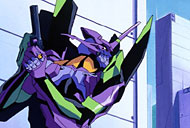
Neon Genesis Evangelion TV
[Please note: the original review for the first two episodes of the series can be found here.]
There was a time when Neon Genesis Evangelion was simply notorious. Then it became a title that everyone needed to see to be considered a true otaku. Now, just hearing the name sends fans into spasms -- most into long outbursts on how it was the greatest show ever, and a few into caterwauls decrying its existence. It may be far more difficult to review this show now than ever before because so many people have an opinion of it. On top of that, the hype machine has made it into a phenomenon of epic proportions. As a reviewer, I can't win. Nevertheless, ten years after the show's debut, it is still debated and discussed throughout the anime community. That's why I'm sitting here writing what is possibly the most superfluous analysis I've ever undertaken. But it's still the second most-requested title for a full-length review in my history -- the first being Berserk, which I hope to get to before year's end -- so here goes.
For those of you who have found yourselves not only buried under a proverbial rock but perhaps under a quarry for the last ten years, Evangelion is about Shinji Ikari. He's a young teenager living in Tokyo-3 in the aftermath of the Second Impact. (What that is, exactly, I'll leave for the show to explain to you.) His father Gendo is a research scientist with an immense amount of power over the Evangelion project, which is producing mecha piloted exclusively by special children on the cusp of adulthood. Shinji's not all that interested in his father or his Machiavellian schemes, but he's forced into battle when giant beings known as angels attack...as it turns out, only the Evangelions have any hope of stopping them. Shinji is ultimately a coward, but under the tutelage of the sweet yet determined Major Misato Katsuragi, he reluctantly steps into the fray. But with the silent enigma Rei and the annoyingly brash Asuka as partners, a megalomaniac dad at the helm, and an ego as fragile as an egg, the angels may not be the biggest problem Shinji faces.
Before I get into the technical details of Evangelion, I do wanted to mention that I watched the original DVD release of Evangelion for this review. Though there is a much shinier, remastered version with little bits of extra footage on the market, I'd already bought the first set, and I really wanted to see the show in its original incarnation. Even so, I think most of my commentary will apply for both versions.
No matter how much you clean up Evangelion, there's always going to be a little roughness to it. The budget overruns were legendary, and so there's a price to pay for some of the brilliant mecha action involved -- some sequences, especially nearing the end of the series, have no motion whatsoever. These are usually limited to dialogue scenes in elevators and so forth, but they are notable. Since it is a mid-'90s creation, the visual look is a little dated, but I'm a fan of that era, so it didn't bother me. I imagine that the remasters will appeal fine to a current audience, since they've cleaned up some of the duller colors and framing issues apparent in other releases. Had I reviewed the show during its original release, I think I would have still found it quite good, but the Evangelion hype train was never truly about the animation quality anyway -- though many of the battle scenes are near-perfect.
So setting aside any issues with Evangelion's facade, is it a program worthy of all the acclaim it has received? Yes and no. My history with Evangelion has been a lengthy one. The first time, I watched the opening videocassette and found it interesting, but two episodes would only get me so far. Then I wound up purchasing the DVDs, but I watched no further than episode 8. After getting that far, my anime viewing buddy and I found other shows we preferred. Finally, after many years and tons of requests, I got around to it again.
So what did I find? I found a show with many great moments interspersed between some interesting character development and some stretches that were, simply, dull. It has a strong opening couple of episodes followed by an interminable sameness and lack of true complexity that, save for a few minor twists, lasts nearly ten episodes. The middle starts to get better, and then the final third jackknifes and becomes Mr. Toad's Wild Ride. By the time it ends, almost all is forgiven...almost.
Evangelion has unique characters that set the series apart but also derail it at times. Shinji is certainly understandable in that he's one of the only anime heroes who simply can't get the job done. Whilst angst over violence is a trademark of anime -- Macross' Hikaru Ichijo struggles with the lives he's taken and Area 88's Shin is obsessed with it -- Shinji is different in that it's his own fear of death that paralyzes him. He's not a particularly moral or heroic guy, which makes his part in the show all that more interesting. Nevertheless, his inability to function does not make him someone we can cheer for. Neither can we support Rei, who is little more than a brainless puppet, or Asuka, who as the self-assured diva turns into one of the least likable characters in the anime canon. The only person I could latch onto was the dedicated Misato, and yet her drinking escapades (played for comedy) underline problems that surface later on. While the characters are complex, I seldom cared what happened to them.
Perhaps that is the intent, and it's what makes the last third such a minefield. Though I may not think these characters are particularly honorable, the final eight episodes of Evangelion send them through sheer hell. These three kids who up to this point haven't ingratiated themselves to me suddenly find themselves in situations far beyond what their bodies and psyches can handle. The audience may desire for them to be taken down a notch, but wowza...nobody gets out of this show unscarred. But from a storytelling standpoint, the concluding episodes are killer. The musical themes that have played out almost repetitively during the first sections gain additional weight and meaning. Everything meshes together by the end, which (contrary to popular opinion) I thought made perfect sense. It is an odd ending, for certain; most mecha shows don't spend their last two episodes inside the heads of the main characters rather than on the battlefield. It's also clearly rushed. But I actually liked the ending not only for its audacity but that, by the last minute, everything is resolved in satisfactory manner.
Much has been made of the Christian imagery and symbolism throughout Evangelion, and it's as much a part of the debate as the ending. But this is one place where I get off the boat. As a biblical scholar pursuing an M.Div, I can stay unequivocally that the symbolism used has little to do whatsoever with Christianity. Can you sit around all day trying to figure out what director Hideaki Anno was trying to accomplish with those symbols? Certainly. But the ending clearly comes from a Buddhist (perhaps even Hindu) perspective and has nothing to do with Christianity whatsoever. This fact makes elements that play into the plot, like a secret portion of the Dead Sea Scrolls, just this side of ludicrous (especially when you consider the Dead Sea Scrolls were Jewish documents, not Christian ones). The show's still enjoyable as it is, but the mystery of all the Christian symbols is, in my opinion, just one large McGuffin.
But what to make of the dull bits? I admit that there were several times where I was bored and had to prod myself forward with the promises that others had made to me that it would get better. (It did.) But I can't say that I will watch Evangelion again because of it. It's really too bad that there isn't a "best-of-Evangelion" compilation out there, because it might be fun (and no, sadly, the short film Neon Genesis Evangelion: Death isn't it, but that's another review.)
So why does it get a little plodding? I think it's ultimately because there are no bad guys. Oh, yes, there are these angels that have to be destroyed, but they have no personality. They exist only as a plot device. Anime on the whole has done a great job of creating complex and interesting villains; here, the only villain we have is Gendo Ikari, and even that's debatable. The angels, on the other hand, attack for the sheer purpose of moving the story forward -- we have no other motivations for them. That's a sad fact because it turns much of the proceedings into a "monster mecha of the week" show.
All of that said, if you like mecha action and you want something with a psychological bent, Neon Genesis Evangelion may work for you. The last third is brilliant. The action sequences throughout are engaging, and many a slow episode gets interesting when an angel appears and we become amazed at the possible brutality of 14-year-olds. Make no mistake -- this is not business as usual. Part of what made Evangelion famous was how mentally bruising the show was towards its characters in its fight sequences. Even I have to admit that very few shows have done one-on-one mecha battles as well as Eva does.
I've rambled enough. If you don't have a good feel for what you'll see, you're not going to get one with any more text from me! I think Evangelion suffers a bit due to the raised expectations of the modern audience anticipating that it's going to be the next epic sci-fi incarnation. Those discovering the series back during its premiere didn't have that burden. So take my rating with a grain of salt. It's there to bring down your hopes just a little if you've never seen it so you'll appreciate it more than I did. My hope is that, if you have never seen Evangelion, you'll take the time to see it, but that you'll do so with more realistic expectations than what anime fandom has set. It's not as fun as Cowboy Bebop, as rich as Fullmetal Alchemist, or as deep as Paranoia Agent. That said, it has influenced a generation of anime programming, and for all of its varied faults, it is worth seeing.
Neon Genesis Evangelion TV -- violence, profanity, very brief shaded nudity, adult themes -- B

